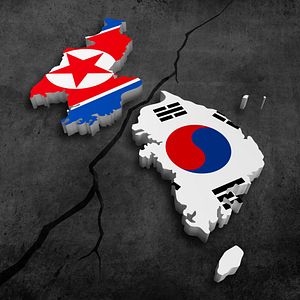Continuing a series of provocations that began ahead of annual U.S.-South Korea military exercises, on Tuesday North Korea conducted a live-fire artillery drill near the disputed Northern Limit Line (NLL) that demarcates the maritime border between North and South Korea. Although no shells landed in South Korean waters, the test resembled an earlier exchange in April that prompted South Korea to return fire.
“The North’s shells fell in waters about 3km (2 miles) north of the NLL [Northern Limit Line, the disputed border],” noted a spokesman for South Korea’s Joint Chiefs of Staff, quoted by Yonhap News. Furthermore, North Korea notified South Korea of its intention to conduct a live-fire drill this time. “The South Korean military is currently monitoring North Korean artillery units, while maintaining high military readiness,” the spokesman added.
The Northern Limit Line is the maritime extension of the land-based demilitarized zone (DMZ) between the two Koreas. In the past, North Korea has demonstrated aggression across the NLL, most notably by sinking the Cheonan in 2010, killing 46 sailors, and shelling Yeonpyeong Island later that year. Yeonpyeong, Baengnyeong, Daecheong, and Socheong islands all remain occupied by South Korean residents who are regularly advised to seek shelter during provocative exercises by North Korea.
While the North abstained from staging a show of force during U.S. President Barack Obama’s Asia tour, which included a stop in Seoul, it has warned that it will carry out a “new form” of nuclear test imminently. Experts remain divided as to what this entails. It could involve the detonation of multiple devices; recent satellite imagery shows increased activity near North Korea Punggye-ri nuclear test site. Punggye-ri was the site of the 2006, 2009 and 2013 tests.
Meanwhile, on Monday, North Korea and Russia signed an economic cooperation agreement. “An agreement on trade and economic cooperation was signed between the DPRK ministry of Foreign Trade and the Amur Regional Government of the Russian Federation,” said the Korean Central News Agency (KCNA), North Korea’s state-run news agency. Apart from the announcement regarding the pact, KCNA provided no additional details on the content or scope of the pact. The bilateral agreement comes as Russian Deputy Prime Minister Yuri Trutnev visited Pyongyang.
According to Yonhap News, Trutnev met with Ro Tu-chol, vice-premier of the DPRK cabinet. “At the talks both sides exchanged views on the issue of boosting the economic and cooperative relations between the two countries and other issues of mutual concern,” said the KCNA report.

































